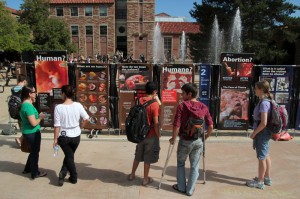Separation of church and campus
With the exception of an occasional Bible-seller by the UMC, it’s highly unlikely that the average CU student will experience any sort of run-in with religion while walking through campus.
A pro-life demonstration from a Christian organization last semester has been the extent of recent public religious expression. This is not surprising when one considers the fact that CU is a state university and therefore religiously unaffiliated.

Students gather around a display discussing abortion in front of the UMC on Oct. 3, 2011. The displays sparked conversation and controversy among students and activists. (CU Independent File/Robert R. Denton)
Yet CU is also home to over forty student groups representing countless religions. At a public university, these groups have every right to gather on campus to hold demonstrations and discussions as frequently and on as large or small of a scale as they’d like.
So, where are these groups?
“Religion isn’t a prominent feature of this student body,” said Anu Reddy, a 21-year-old senior international affairs major. Reddy is a member of Project Nur, a student group that aims to debunk misconceptions about Muslims. “Sometimes it’s hard attracting an audience.”
While religious groups are free to exercise their rights to speech and assembly, they are somewhat deterred by another element of the First Amendment — the separation of church and state, a concept that CU takes seriously.
Matt Boettger, th president of Religious Campus Organizations, oversees the 40-plus ministries and is also in charge of bringing academic lectures and debates on religion to CU through the St. Thomas Aquinas Catholic Center. He said that the university’s general policy is to tread lightly.
“Colorado has a very strict interpretation of the separation of church and state,” Boettger said. “CU follows that lead and tries to be cautious.”
In 2007, the Federal Court supported the state’s ban on using public funds to financially support religious education in the case Colorado Christian University v. Baker. For a public college like CU, distancing itself from identifying with any religion is particularly important.
“There was talk of having a prayer room in the C4C, but that was shut down at the last minute,” Boettger said. “Legalities prevent these kinds of things. It’s difficult to navigate religion in a school setting.”
Two thousand miles away, at Boston University, a similar proposal is being debated.
Hindu students have asked their administration to build a permanent prayer room on campus. Rajan Zed, the president of the Universal Society of Hinduism, released a statement in the students’ favor.
“Universities need to recognize the intersection of spirituality and education,” Zed said.
Boston University is not affiliated with a specific religion, but it is private, unlike CU. Trent Emory, a 25-year-old junior broadcast news major and the president of the Secular Students and Skeptics Society, said that he would be outraged if CU financially sponsored anything religious.
“This is America, so everyone should be able to practice their religions freely and express themselves,” Emory said. “However, if university funds are involved, that’s flat-out unconstitutional.”
But campus religious organizations aren’t completely without support. Because they are student groups, they can appeal to the student government, though they primarily support their efforts from within, often by fundraising.
Despite issues forcing CU to stay mum on religion, there are inclusive policies in place, including the Religious Holidays policy, which states that “The University of Colorado at Boulder has a legal and moral obligation to accommodate all students who must be absent from classes or miss scheduled exams in order to observe religious holidays.”
“There’s a lot of support on campus,” said Paulette Foss, official advisor for the Zen Society. Foss has been involved with the group since she was a graduate student seventeen years ago. “There’s a fair bit of tolerance here. When the Muslim students pray outside of their office in the UMC, people that come around the corner and see them are respectful.”
Carly Coons, a 22-year-old senior international affairs and religious studies double-major, agrees. Coons was this past year’s president of Hillel, one of the Jewish student groups on campus, and said she “absolutely” feels supported by CU.
“At a public university, it’s really important to offer students everything, which CU does,” she said. “The overall presence of religion on this campus is whatever you make it. If you’re looking for a way to find religion, there’s an outlet for that. If you’re looking for a secular college experience, you can find that easily.”
But the answer varies as to whether or not CU provides a supportive atmosphere to religious students.
“It offers unique challenges to those with particular faith beliefs,” Boettger said. “CU isn’t comparatively welcoming, and it has the stereotype of a party school. Overall, [the university] is helpful to us, within the proper limitations. But some students may feel as though they’re the minority, as though they’re slighted or pushed aside.”
Brandon Buckner, a senior Asian studies and international affairs major, is a member of CU’s Christian Science organization. Before moving to Boulder, he attended George Washington University in D.C.
“Should religion be on campus? That’s not for me to say. There’s little support [from CU], but I don’t have any anti-sentiments,” Buckner said. “I don’t lose sleep over it.”
Though groups hold events and gatherings, these occur predominantly within the bounds of that group, reaching out to other students but rarely affecting a wide audience.
“It’s a good thing that people have these resources,” Trent Emory said. “I have a bit of a problem when they proselytize, but that doesn’t happen very often here. Everyone is really relaxed.”
Despite the touchy subject, the simple knowledge that they attend a public university and have the freedom of expression seems to be enough for these organizations.
“I feel as though CU is on the side of being secular, with an atheist bent,” Buckner said. “But I don’t say that with any negative connotations. I’m grateful that they provide organizations with the ability to be as loud or as quiet as they wish to be.”
Contact CU Independent Breaking News Editor Annie Melton at Anne.melton@colorado.edu.
Related posts:
- Boulder Church of Scientology Mission on Pearl Street
- Faith could play big role in 2008 election
- Series: Religionism at CU
- Eric Church stays authentic
- CU students turn to Tibetan Buddhism for spirtiuality




